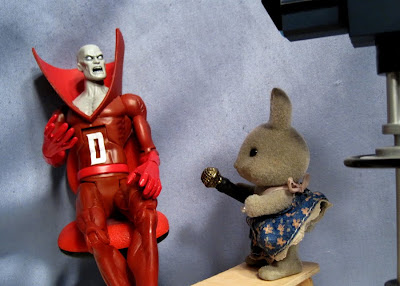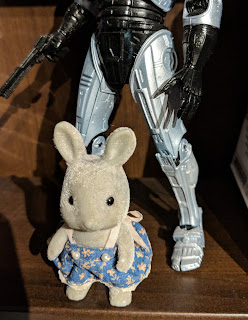Interview with the Vampire
Interview with the Vampire
Anne Rice, 1976
Anne Rice, 1976
I come to this book from a weird position. I've read plenty of stuff inspired by this series, (Hello World of Darkness,) but never anything actually from it before. I don't think I was missing much. As far as I know, Anne Rice is the source of the angsty vampire tradition. This is definitely the first (and as far as I know only) book I'm going to read in this theme in which the protagonists are all vampires.
I was surprised how much I liked this book at first, but it just became too long. For a book that clocks in under 350 pages, that's not a good sign. I got bored with the endless “oh no, what are we vampires, are we evil, are we damned, oh angst angst angst...” after about page 150. And they didn't even come up with any good answers to their own questions, just ending on sort of an existential shrug. The main character is Louis, a fairly wussy vampire who fluctuates between practicing the openly masochistic habit of feeding only on animals and trying to embrace his murderous vampire-ness, but he's never very good at either extreme. He's somewhat interesting at the start for his descriptions of his changed perception; everything is more special, more interesting, more beautiful to him as a vampire. But nothing ever really comes of it, and it finally began to just remind me of how quickly Toreadors become annoying to play. (If you don't get that reference, good for you.)
Claudia is an interesting example of the child-vampire. I liked her frustration with her child-body not matching her mature mind, and I liked that when they finally met up with some other vampires, they explain that making children into vampires is frowned upon for just the problems she's run into. It's a rare example of something they do making sense.
A few other points about this book in comparison to the previous books and ones to come: vampires here seem to be passionate about murder, about life, about each other, but are stated to be incapable/uninterested in sex, homosexual impulses rule the day in these particular relationships, and the vampires are presented as fundamentally inhuman, but still capable of feeling, and not necessarily monstrous.
However, it isn't all bad. My favorite scene (spoiler ahoy) is after Louis and Claudia destroy a revenant (a mindless vamp, completely inhuman-looking) and they run back into the inn they vacated earlier, winning sanctuary from the locals by claiming, truly, to have heroically killed the vampire. That was awesome. (spoiler end)
2 Stars - An Okay Book
I am aware that Ms. Rice powered up her vamps in later books, but this is the only one I'm reading, so...
Vampiric powers in Interview with the Vampire include:
Hypnosis/trance, seems to require proximity, older vampires are more powerful
Super-strength
Super-speed
No stated Animal Control
Do not turn into bat, wolf, dust
Appearance fixed at age of death, are described as very very cold and white-pale, human appearance is tied to ingestion of blood.
Limitations are very very few, include:
Only awake during darkness, cannot stay awake during the day
Also:
Do not need connection to holy soil from native land
Do not need to sleep in a coffin, but often do for safety
Do not need to be invited into a building
Not weak against garlic
Not driven back by holy symbols
No difficulty crossing running water
New vampires?
Made by draining the blood of the victim almost until death, then forcing the victim to drink a good quantity of the vampire's blood. There also seems to be some intermediate state where a victim partially drunk from remains alive and feels attached to the vampire. New vampires go through a painful process where they 'finish dying', then sometimes learn slowly, do immediately gain exceptional speed and strength. New vampires are chosen carefully.
How to destroy:
“'The destruction of your remains,” he said. 'Don't you know this? Fire, dismemberment…the heat from the sun. Nothing else. You can be scarred, yes; but you are resilient. You are immortal.”These guys are very very hard to kill, and can come back from quite a bit of damage. Armand implies that many vampires commit suicide by sunlight when they become sick of immortality or hopelessly confused by the changes in the human world.
Next Week:
Guilty Pleasures, by Laurell K. Hamilton.
I've picked this one as representative of the rise of the supernatural romance genre in the 90's. Also I have a copy.
Guilty Pleasures, by Laurell K. Hamilton.
I've picked this one as representative of the rise of the supernatural romance genre in the 90's. Also I have a copy.



I read this book before being aware of the WORLD OF DARKNESS, and although I don't believe it's fair to credit it with creating the Romantic Angst vampire genre, it's definitely a landmark title.
ReplyDeleteI think it deserves credit for doing a better job with of making genuinely interesting (to a point) characters with lot of the genre cliches contained (child vampire, Louis & Lestat's basic characers...) than much of what came later.
Of course it deserves credit for its place in the literature. Although I'm not sure I would call Louis or Lestat "interesting" so much as "annoying", but that could be me. This is the first of the sympathetic vampire books I'm reading right now, so my attitude could be a side effect of the transition from evil beasts to humans with a... condition. Still, placing them side by side like this, I so far prefer the former.
ReplyDeleteThe book has great moments, but I did have to force myself to finish it.
That's one reason I enjoyed the movie so much more... it ended with a bang rather than a whimper. Someone figured out that glamorous loose-cannon Lestat laughing as he returns to unlife was a better closing note than more of Louis's moping.
ReplyDelete